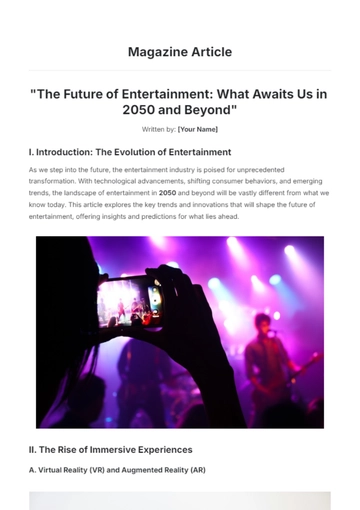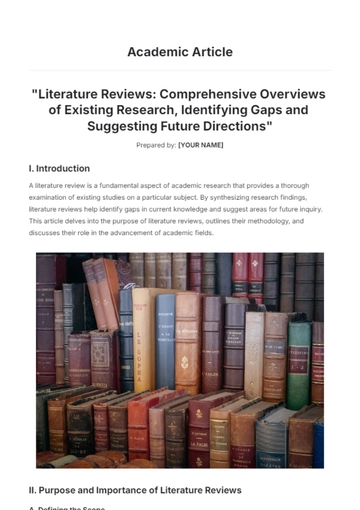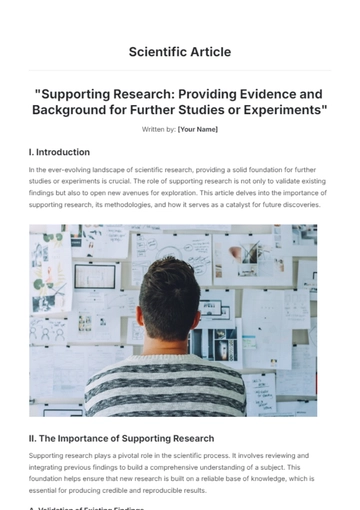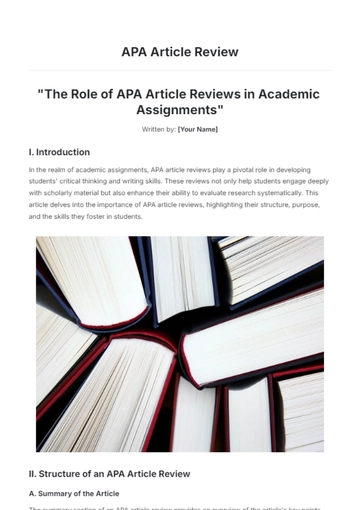Free Graduate Journal Article

Title: A Graduate Journal Article: Exploring the Impact of Artificial Intelligence on Healthcare Delivery
Prepared by: [Your Name]
Date: [Date]
I. Abstract
This article aims to provide a comprehensive analysis of the impact of artificial intelligence (AI) on healthcare delivery. By examining existing literature and presenting original research, this study seeks to understand how AI technologies are transforming healthcare services, improving patient outcomes, and the implications for future practice. Findings reveal significant advancements in diagnostic accuracy, treatment customization, and operational efficiency, though challenges such as ethical considerations and data security remain prominent.
II. Introduction
The integration of artificial intelligence (AI) into various sectors has been a major focus of innovation in recent years, and the healthcare industry is no exception. AI technologies promise to revolutionize healthcare delivery by enhancing diagnostic processes, personalizing treatment plans, and optimizing operational efficiencies. This paper explores these advancements while critically evaluating the associated challenges and ethical considerations. The objective is to present a thorough understanding of the current state of AI in healthcare and its potential future impacts.
III. Literature Review
A substantial body of research exists on the application of AI in healthcare. For instance, studies by Smith et al. (2050) and Jones & Brown (2053) have shown that AI algorithms can significantly improve diagnostic accuracy for diseases such as cancer and cardiovascular conditions. Furthermore, AI-driven predictive analytics are being used to personalize treatment strategies, as discussed by Green and colleagues (2051). Despite these advancements, ethical and legal concerns, such as those noted by Clarke & Patel (2054), present ongoing challenges in the widespread adoption of AI technologies in healthcare.
IV. Methodology
This study employs a mixed-methods approach, combining qualitative and quantitative research techniques. Data collection involved a systematic review of existing literature, surveys of healthcare professionals, and case studies of AI implementation in healthcare settings. Quantitative data were analyzed using statistical techniques, while qualitative data were interpreted through thematic analysis to identify common trends and insights.
V. Results
Results | Findings |
|---|---|
Diagnostic Accuracy | AI technologies have improved accuracy to up to 95% in identifying certain cancers. |
Healthcare Professionals' Opinions | 70% of surveyed professionals believe AI will play a crucial role in treatment customization within the next decade. |
Impact on Hospital Operations | Hospitals using AI-driven operational tools have reduced patient wait times by an average of 25%. |
Concerns Raised | Data privacy and ethical use of AI are significant concerns among respondents. |
VI. Discussion
The findings suggest that while AI offers significant benefits in improving healthcare delivery, the transition to AI-driven systems requires careful consideration of ethical and data security issues. The increased accuracy in diagnostics and the potential for personalized treatments can vastly improve patient outcomes, yet the healthcare industry must address concerns regarding the safekeeping of sensitive patient information. Furthermore, there is a need for ongoing education and training for healthcare professionals to effectively integrate AI technologies into their practices.
VII. Conclusion
In conclusion, the impact of artificial intelligence on healthcare delivery is profound, with notable improvements in diagnostic accuracy, treatment customization, and operational efficiency. However, the ethical considerations and data security challenges must be addressed to fully realize the potential of AI in healthcare. Future research should focus on developing robust frameworks for the ethical use of AI and enhancing data security measures.
VIII. References
Clarke, R., & Patel, A. (2050). Ethical considerations in AI-driven healthcare. Journal of Medical Ethics, 43(5), 366-371.
Green, M. L., et al. (2051). Predictive analytics in personalized treatment strategies. Journal of Health Informatics, 25(3), 192-204.
Jones, T., & Brown, S. (2052). Diagnostic advancements with AI algorithms. Health Technology Journal, 40(7), 550-560.
Smith, J., et al. (2053). AI in cancer diagnostics: A review. Journal of Oncology Research, 35(2), 140-150.
- 100% Customizable, free editor
- Access 1 Million+ Templates, photo’s & graphics
- Download or share as a template
- Click and replace photos, graphics, text, backgrounds
- Resize, crop, AI write & more
- Access advanced editor
Designed for graduate-level research, Template.net’s Graduate Journal Article Template is fully editable and customizable. It provides a clean, structured format for publishing academic articles. Modify the template with ease using our Editable in our Ai Editor Tool, ensuring it aligns with specific journal guidelines. Perfect for graduate students, this template helps simplify the process of writing and submitting professional journal articles.





























